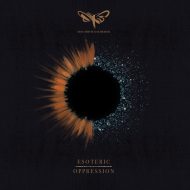 I like insects as a subject. I like analogies with insects. Milemarker’s Insect Incest is one of my all-time favourite songs. I like how you can derive the governing rules of bigger systems from smaller ones. I like how everything, absolutely everything is connected. I’m intrigued by chaos theory and the idea of the butterfly effect. And moths are basically nocturnal butterflies. The Moth Gatherer, a post metal band from Stockholm, Sweden had my attention right from their name.
I like insects as a subject. I like analogies with insects. Milemarker’s Insect Incest is one of my all-time favourite songs. I like how you can derive the governing rules of bigger systems from smaller ones. I like how everything, absolutely everything is connected. I’m intrigued by chaos theory and the idea of the butterfly effect. And moths are basically nocturnal butterflies. The Moth Gatherer, a post metal band from Stockholm, Sweden had my attention right from their name.
What’s so special about moths? They are predominantly nocturnal creatures, but drawn towards the light. Why that’s the case nobody knows for certain. What’s worse, in today’s light polluted world it’s fatal for them, because predators lurk around light sources. Bats, for example. I can watch the feasting every summer at the street lamp on the corner of our street. Why is it problematic if the number of moths diminishes? What purpose do they serve in nature? Well, it turns out a very important one: They are responsible for nocturnal pollination. Which means they are of similar importance as bees. Light pollution from city lights is indirectly diminishing the number of moths, rapidly and constantly, and where that will lead, nobody knows, but guesses are that it’s not leading towards something good. And that brings us right to the misanthropic themes of The Moth Gatherer’s new album Esoteric Oppression. Come with me, sink into the black hole on the albums cover, and see where we have brought ourselves.
In the first part of the video to the pre-released track The Drone Kingdom you can see, in sober black and white, uninhabited, mostly marine landscapes, impressive and mighty. But soon the breath-taking, awe-inducing beauty is soiled by pictures of human activity. We see industrial production, air pollution and garbage-filled seas. Also, the pictures begin to pixelate, to become less clear. First, there are only small distortions, like errors in the transmission signal (the analogical butterfly, or moth in this case, flapping its wings), but then the distortions become stronger and last longer, and in the end, the pictures of glaciers melting, the consequences of global warming, are distorted beyond recognition. Nothing remains from the beauty we saw in the beginning.
The music starts out with synthesizer or computer-generated sounds, among them a recurring one reminding me of some kind of horn being blown. It evokes various connotations, from ancient societies and their calling sounds, to today’s ships’ horns and distress calls. Of the track’s nine minutes running time, this experimental intro takes up over two and a half minutes setting an end-times mood. After that intro, drums, guitars and bass set in with all their might. The band’s sound is bass-heavy and sludgy. The male vocals are throaty and screamed, but do not dominate the sound. The tempo is relatively slow and dragging. Somewhere in the middle part of the track monotone drumming introduces a break, after which impressive female vocals are added (Messy Mathi of Barst). Impressive, because there are no lyrics, yet so much is conveyed.
The atmosphere that’s established by The Drone Kingdom, a feeling of not being sure whether you are in a pre- or post-civilisation surrounding, is maintained throughout the album. As is quality. There are no fillers among the album’s five tracks. All are similarly excellent. In general, the band’s sound is marked by its closeness to the sound of the genre’s titans, Neurosis and Isis. If you like their music, you will like this as well. Sometimes the sound is a bit blackened, but what’s always there is lots of variation. Variation is a good thing, because it means that you won’t get bored exploring the album’s soundscapes. It’s mostly due to the synth work or the computer-generated sounds, which will take your mind to all sorts of places.
Now, what rating to give to this? The sound is not new and has been around for a couple of decades. But that is really the only thing one could criticize about this album. The Moth Gatherer, along with other bands, prove that post metal is here to stay. Bands keep playing it and audiences keep listening to it. That is probably because we live in a “post” world. Post truth, post stability, post structural integrity, post everything. This kind of music, heavy, yet not dull, rich in variation and experimentation, is a good representation of our times. Yes, it’s becoming increasingly difficult to make a very good post metal album, but I’d say The Moth Gatherer have managed to do so.
(8.5/10 Slavica)
https://www.facebook.com/TheMothGatherer
https://agoniarecords.bandcamp.com/album/esoteric-oppression

Leave a Reply